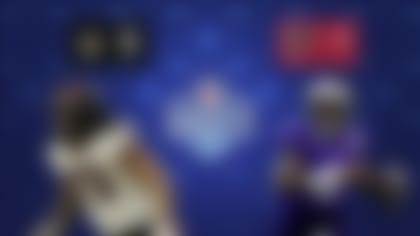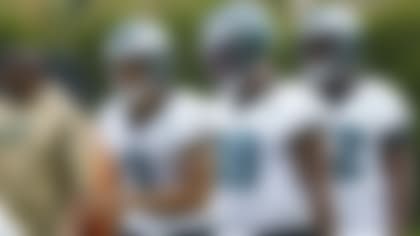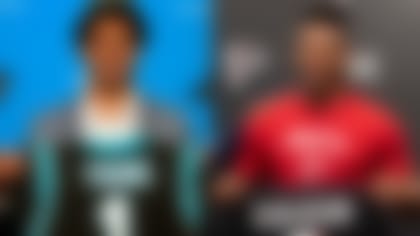Why provide instant grades on the selections of prospects who have yet to take an NFL snap? Well, you're reading this, aren't you? Considering the makeup of every roster and the factors surrounding each pick, Gennaro Filice and Dan Parr attempt a division-by-division assessment of the 2020 NFL Draft. Keep in mind that these grades are based on draft hauls alone -- picks traded for veteran players were not taken into account. Below is Gennaro's review of the NFC South.
NOTABLE SELECTIONS
Best Pick:

Draft slot: Round 2, No. 59 overall
With all-around playmaker D.J. Moore, deep threat-plus Robby Anderson and offseason depth addition David Moore in the fold, Carolina already had a pretty stout receiving corps. But the Panthers were missing one sizable piece: a physical, athletic, contested-catch guy to go up and get it. No longer. The Panthers snagged one of the few big bodies available in this abnormally small receiver class -- Nico Collins was the only other wideout standing at least 6-foot-2 to be selected in the first three rounds -- and they remarkably did so in the back end of Round 2. Marshall would've been long gone if not for some concerns about his injury history, but the risk was certainly worth it here, given Marshall's rare skill set, Carolina's need and the value proposition at No. 59. The size-speed combo was a scoring machine at LSU, scoring 23 touchdowns in his last 19 games, and now he's reunited with his old college offensive coordinator, Joe Brady. This pick sings!
Most Surprising Pick:

Draft slot: Round 1, No. 28 overall
Perhaps we shouldn't be surprised. Three years after boldly spending a first-round pick on a lengthy Group of Five defensive end with raw tools and a juicy RAS score ... New Orleans boldly spent a first-round pick on a lengthy Group of Five defensive end with raw tools and a juicy RAS score. Marcus Davenport -- whose selection back in 2018 was all the more stunning because it cost the Saints two first-rounders, as they traded up 13 draft slots to acquire his services -- has not lived up to expectations in New Orleans. The oft-injured 24-year-old has totaled 12 sacks over his first three NFL seasons. Will Turner reward the Saints' decision to double down on a draft strategy that burned them the first time around? Sean Payton and Mickey Loomis sure hope so. They spent years seeking a pass-rushing partner for Cameron Jordan before Trey Hendrickson supplied 13.5 sacks last season. Unfortunately, right after Hendrickson broke out, he cashed in, signing a four-year, $60 million deal with Cincinnati. Can Turner help fill the void? "He's got a lot of blue traits, traits that would be considered elite in terms of the measurables and some of the time shuttles and things like that," Loomis said. "So, yeah, he certainly has the traits." Will the traits transfer to NFL production?
Biggest Sleeper:

Draft slot: Round 5, No. 158 overall
No position in this draft caught nearly as much pre-draft flak as defensive tackle. NFL Network's Daniel Jeremiah called it the worst DT group he's seen, in terms of top-end talent AND depth, since he began scouting in 2003. Then the draft began, and Round 1 didn't include a single defensive tackle for just the third time in the common draft era (joining 1989 and 2017). Nine DTs came off the board in Rounds 2 through 4, but Nixon -- whom NFL.com's Bucky Brooks ranked as the No. 3 player at the position -- remained available. Finally, midway through Round 5, Carolina seized Nixon as DT11. Asked about the value of getting this prospect in this draft slot, first-year GM Scott Fitterer praised the team's process: "Just let the board work and come to us instead of us chasing players. It just got to a point (where) we couldn't pass him. He was too good." Nixon was indeed quite good in his breakout 2020 campaign. The penetrating 3-tech racked up 13.5 tackles for loss and 5.5 sacks in eight games. And he provided the best BIG MAN TOUCHDOWN of the recent vintage, putting an exclamation point on Iowa's win at Penn State with a 71-yard pick-six that included a midfield Euro step past the Nittany Lions' poor quarterback.
TEAM GRADES
NOTE: Draft classes are displayed from best to worst within the division.
Round 1:
- (No. 8) Jaycee Horn, CB, South Carolina
Round 2:
- (59) Terrace Marshall Jr., WR, LSU
Round 3:
- (70) Brady Christensen, OT, BYU
- (83) Tommy Tremble, TE, Notre Dame
Round 4:
- (126) Chuba Hubbard, RB, Oklahoma State
Round 5:
- (158) Daviyon Nixon, DT, Iowa
- (166) Keith Taylor, CB, Washington
Round 6:
- (193) Deonte Brown, OG, Alabama
- (204) Shi Smith, WR, South Carolina
- (222) Thomas Fletcher, LS, Alabama
Round 7:
- (232) Phil Hoskins, DT, Kentucky
Gonna lay my cards on the table here. I'm extremely conflicted with this grade. Truth is, I'm still kinda floored that the Panthers had Justin Fields fall right into their lap ... and they triggered the ejector seat. "The hit rate on first-round quarterbacks isn't real, real high, and to have a chance to get Jaycee Horn and have Sam Darnold, we just kind of felt like, 'Hey this is two-for-one,' " Matt Rhule explained on The Rich Eisen Show. "Now, we just have to make sure Sam's a great player for us." Easier said than done. Darnold was undoubtedly dropped into a rough situation with the Jets, but he wasn't just bad in New York, he was awful -- finishing near the bottom of qualified passers in completion percentage and passer rating all three years, including dead last in the latter (72.7) this past season. Not to mention, 2021 is Darnold's final cheap rookie contract season; the fifth-year option Carolina exercised on the Friday after Round 1 will pay him $18.858 million in 2022. If the Panthers had taken Fields at No. 8, he'd be due to earn about $5.275 million per year through 2024, per Spotrac. So I'm struggling with the rationale on that decision. BUT, if I remove the Fields factor from the equation, and just view Carolina's draft in a vacuum, I really like the team's haul! Heading into the draft, I viewed the Panthers' three biggest non-quarterback needs as cornerback, wide receiver and offensive line, and they checked those boxes with their first three picks. A lot of the middle-round selections look sharp, too, including Tremble (who got lost in the shuffle of Notre Dame's NFL tight end factory), Nixon (who's way quicker than a 313-pounder should be) and Brown (a massive man who blows open massive holes). So ... I'm docking Carolina a full letter grade for passing on Fields, but giving the franchise as solid a "B" as mathematically possible. We're talkin' 86.4%.
Round 1:
- (No. 4) Kyle Pitts, TE, Florida
Round 2:
- (40) Richie Grant, S, UCF
Round 3:
- (68) Jalen Mayfield, OL, Michigan
Round 4:
- (108) Darren Hall, DB, San Diego State
- (114) Drew Dalman, C, Stanford
Round 5:
- (148) Ta'Quon Graham, DE, Texas
- (182) Adetokunbo Ogundeji, OLB, Notre Dame
- (183) Avery Williams, DB, Boise State
Round 6:
- (187) Frank Darby, WR, Arizona State
The gamebreaker hype on Pitts couldn't be any higher, as evidenced by the fact that he just became the highest-drafted tight end in the common draft era and no one really questioned the pick. It was treated as a fait accompli. Nary an eyebrow raised! In today's take economy, where contrarianism's cryptocurrency-hot, this is rare. But so is Pitts. As a 6-6, 245-pounder with vice-grip hands and 4.4 speed, the 20-year-old has talent evaluators competing to provide the splashiest assessment. One GM told NFL Network's Tom Pelissero, "I'm usually against drafting tight ends that high, but that motherf-----'s bada--." While Atlanta clearly approached Day 1 with a best player available mindset, the Falcons looked to address needs in Day 2. Grant's a do-it-all safety who should be a Day 1 starter for Atlanta, which finished last season with the worst pass defense in the NFL. Mayfield initially got some first-round-tackle buzz after declaring for the draft, but the pre-draft process didn't treat him well. He bombed the athletic testing at his pro day, and the sub-33-inch arm length didn't help, either. The 326-pounder's probably looking at a move to the interior in the NFL, especially considering POWER is his calling card as a blocker. Atlanta did some nice work in Day 3. Two picks that really stood out to this grader: Dalman, who should compete for the starting center job; and Williams, who had insane special teams production at Boise State as a dangerous returner and prolific kick blocker.
Round 1:
- (No. 32) Joe Tryon, OLB, Washington
Round 2:
- (64) Kyle Trask, QB, Florida
Round 3:
- (95) Robert Hainsey, OT, Notre Dame
Round 4:
- (129) Jaelon Darden, WR, North Texas
Round 5:
- (176) K.J. Britt, LB, Auburn
Round 7:
- (251) Chris Wilcox, CB, BYU
- (259) Grant Stuard, LB, Houston
What do you get for the team that has everything? As you probably heard (... five times in the past 12 minutes), the defending Super Bowl champions are returning all 22 starters. So the pre-draft NEEDS checklist was kind of an exercise in semantics. But with Jason Pierre-Paul in the final year of his contract, edge rusher felt like as big a "need" as Tampa had, and the Bucs addressed it immediately by making Tryon with the last pick of the first round. The U-Dub product's a tough evaluation, as he opted out of the 2020 season, which would've been his second year as a full-time starter. Apparently, though, he cleaned up his diet, further enhancing a lengthy frame that was made for edge rushing. Bucs fans are undoubtedly eager to take the updated model out for a spin, but the pick made sense from a relative need and fit perspective. I can't say the same about Tampa's second-round selection. Athleticism definitely isn't Trask's bag, which is fine -- that's not Bruce Arians' type. But the Florida quarterback also isn't known for the kind of arm strength demanded in Arians' "No risk it, no biscuit" system. Clearly, Trask wasn't drafted to contribute in this year's repeat attempt, but does his long-term potential in this offense really merit a second-round pick? Hainsey, on the other hand, seems like a savvy depth addition who could back up multiple positions in a pinch. Darden's another sensible middle-round pick. As a nightmare to corral in the open field and a home run threat over the top, the North Texas product adds an electric element to the receiving corps. Oh, and he's comin' in hot with the No. 1 jersey. Gotta like the chutzpah there.
Round 1:
- (No. 28) Payton Turner, DE, Houston
Round 2:
- (60) Pete Werner, LB, Ohio State
Round 3:
- (76) Paulson Adebo, CB, Stanford
Round 4:
- (133) Ian Book, QB, Notre Dame
Round 6:
- (206) Landon Young, OT, Kentucky
Round 7:
- (255) Kawaan Baker, WR, South Alabama
The Saints march to the beat of their own draft drum. New Orleans' first-round selection was a surprise -- not just in terms of the player, but also the position targeted. The roster's two biggest needs were cornerback and wide receiver, and the available prospect pool offered assorted options at each spot. But Sean Payton and Mickey Loomis went back to the 2018 playbook, opting instead for a developmental edge who's eerily similar to first-round disappointment Marcus Davenport. In Round 2, the Saints scooped up a pro day wonder in Werner whose actual on-field play is more dependable than dynamic. New Orleans finally tended to the screaming need a cornerback in the third round, trading up for Adebo. He's a scheme fit with significant man-coverage experience, but the Saints will need the 2020 opt-out to get back in the groove of things quickly. Book holds the distinction of being the winningest quarterback in Notre Dame history, but his selection in the fourth round was completely unexpected. With intangibles that far outstrip his tangibles, Book was widely projected to be drafted much later in Day 3, if at all. I know he's nearly the exact same size as Drew Brees, but it's time to let go, Saints.
Follow Gennaro Filice on Twitter.
















